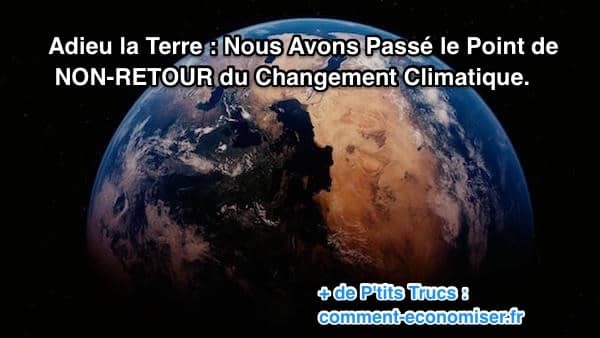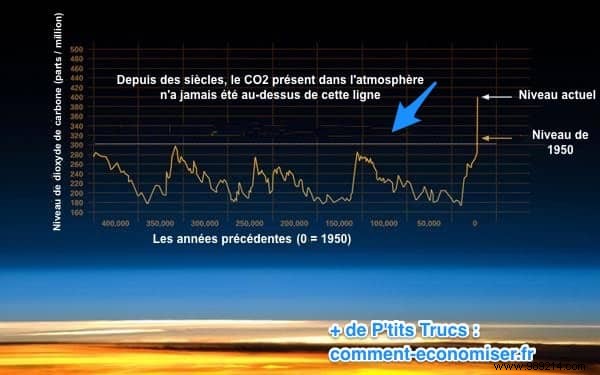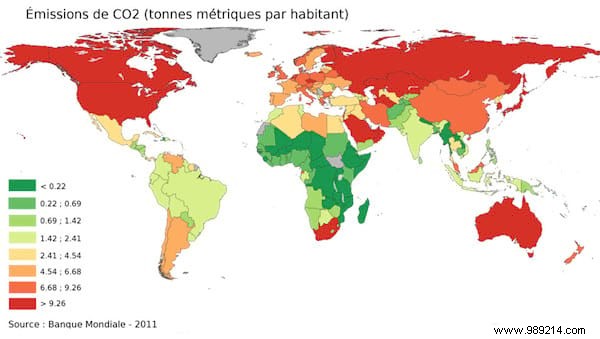
The end of the world has already begun...
Why am I so pessimistic?
Because the CO2 in the Earth's atmosphere has reached a sad record. How much?
Well the CO2 concentration reached 400 parts per million (ppm).
According to a blog post published by the Scripps Institute of Oceanography, "everything leads us to believe that this value will not decrease any further... It will only increase."
So we have reached a point of no return...

These projections are based on CO2 monitoring, week by week, since 1958, carried out from the Mauna Loa Observatory in Hawaii.
A few years ago, scientists warned us.
If the concentration of carbon in the atmosphere were to exceed 400 ppm, it would mark a turning point in the history of our climate.
Why ? Because we would have reached a threshold effect likely to bring us into a dark period.
A period when global warming would become totally irreversible.
Look what it looks like on the graph below. It's chilling :

For the experts, there is no doubt:the levels of carbon concentration will unfortunately not go down any more...

This terrifying news, however, could have a virtuous effect.
Namely:to terrify the population, to create awareness and to encourage the leaders of the countries to take concrete and immediate measures.
To a certain extent, this is what happened with the Paris Agreement.
Indeed, it is the first international agreement whose objective is to fight against global warming with concrete and firm objectives.
The 194 countries that have signed the agreement have pledged to limit the increase in temperature below 2 degrees and even to tend towards 1.5°C.
To achieve this goal, carbon emissions will have to be reduced and renewable energies will have to be developed.
Unfortunately, Donald Trump, the American President, has decided to withdraw the United States from the Paris Agreement.
This is an irresponsible decision given the issues we have just discussed, especially since the United States is the 2nd largest emitter of greenhouse gases in the world.
Not to mention the results of the last COP 26 which are very disappointing!

It is estimated that the rate of extinction was 1,000 times slower before the appearance of modern humans than it is today.
According to WWF, 10,000 additional species disappear every year. Which means that by 2050, 1/4 of species could become extinct because of climate change.
If the subject interests you, do not hesitate to read The Sixth Extinction:How Man Destroys Life by Elizabeth Kolbert.
The direct consequence of species extinction is the breaking of the food chain .
Why ? Because if the big predators disappear, the food chains will be irreparably modified.
Take the example of the Arctic:rising ocean temperatures threaten the development of seaweed.
They are the ones that provide essential zooplankton nutrients to cod, seals and polar bears.
Know that in Alaska and Canada, temperatures have increased by 7°C in 50 years.
Millions of humans and many other living species will be quickly and dramatically impacted by rising sea levels.
The glaciers are melting and the geography of the coasts is changing. The seas and oceans are invading the land and pushing the inhabitants to immigrate.
By 2100, the oceans will deprive 13 million people of their homes. This is what is already happening in the Pacific Ocean.
With the melting of the glaciers, the physiognomy of our coasts will change and populations will be forced to move.
Scientists believe that this phenomenon is irremediable even if we manage to stop the rise in temperatures.
The acidity of the oceans is one of the main indicators of environmental health.
However, the fact that the pH of the oceans is increasingly acidic has catastrophic consequences for nature.
Acidification has already caused the disappearance of entire ecosystems.
It must be said that the oceans permanently absorb the excess CO2 in our atmosphere.
This mechanism has the consequence of reducing the pH of the oceans and therefore making the waters more and more acidic.
Corals are the main victims:Australia's Great Barrier Reef is dying.
Although the roots of coral polyps can still regrow in reefs, marine ecosystems will never be the same after they are destroyed.

Despite this bad news, we must not give up.
On the contrary, we must continue to fight for the planet and our children.
For this, we can all act on a daily basis. How? 'Or' What ? By applying simple gestures everyday like these.
We can also try to reduce our plastic waste with these tips.
We can also easily consume less drinking water by taking the right steps like these.
Not to mention that you can also save energy with little tips that are easy to put in place.
If millions of us implement these tips on a daily basis, we have the power to make a real difference.
So, ready to take up the challenge together? :-)